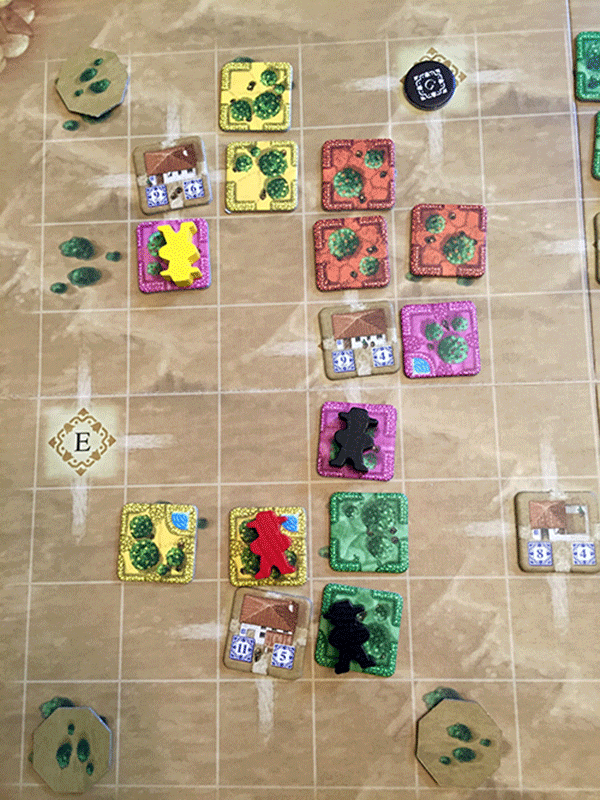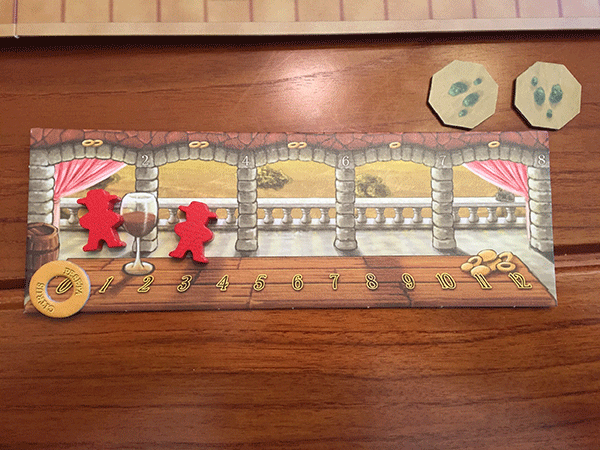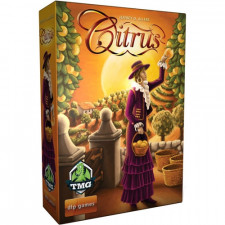Citrus Review
on Sep 8, 2016
Euro-style game rule books typically bug me. My excitement wilts under litany of restrictions, constraints, and boundaries to the limited number of actions you can do. Of course, the really good ones prove the old adages about creativity and constraint. Citrus is one of those good ones. There are more rules about how you can or must take actions than there are actions you can take. The game that emerges from the arid rules is a fast and tense affair.
Plant and Harvest. Those are the only two actions you can take on your turn and executing them is rather simple. Planting involves buying a full row of plantation tiles from their side board and planting them on a shared board that is as bland as the plantation tiles are colorful. Harvesting requires you to remove a farmer from one the plantations you’ve been growing and putting it back on your farmer tile. The more farmers you have on your farmer tile, the more coins you receive in income. The larger the plantation you remove that farmer from, the more points you score.

That’s about it. Buy 1-4 colorful plantation tiles and put them on the board, growing old plantations or starting new ones. Mark each new plantation with one of your farmers. Harvest as necessary. Simple on the surface, but peel that away and Citrus blossoms in those restrictions, constraints, and boundaries that usually sour me on Euro games. As the game progresses, your options for placing purchased planation tiles becomes smaller and smaller. Farms must have a unique color placed adjacent to their orthogonal directions which means that Kelly playing a Lime tile on the juicy new farm on her turn means you can’t place one there yourself. Oh and did I mention she only left you with lime tiles on the plantation board? Jerk.
Or maybe she didn’t do that. Maybe there are two nice Lemon tiles you can grab and even lay adjacent to that new farm and snag a landscape tile. The bonuses they provide are nice, but you’d have to put your last worker out on to the board. You’re probably out of cash at this point which means next turn you’re taking one of those workers off the board and abandoning the plantation you’ve been building for a while. You’ll get the same points you’d get at the end; that isn’t the worry. The concern is now that neutral farm can be claimed by an opponent whose sprawling Blood Orange plantation is getting dangerously close to yours. You also give up the chance to get points from the farm you’re next to.
Simple actions. Simple executions. Mind-puckering decisions. There is so much to be lost by harvesting your farms. Until they’re sufficiently large or blocked in, there is always the risk of an opponent absorbing what you’ve left behind and scoring it again later. It can be difficult, especially with low player count, to force the early scoring of a farm by completely surrounding it so there are a lot of points to be left on the table by harvesting. On the other hand, you simply can’t keep going without generating income and the more active farms you have farmers working on the less money you get.

You’re always one coin or one tile short of the perfect turn forcing you to wait on the edge of your seat while your opponents act and it circles back to you. This is actually one of the problems with Citrus. With 2 or 3 players it isn’t a big deal regardless of whether you play on the short or long board. With more, the game ends too soon with too few turns. It’s hard to plan for what plantations will be left and the board gets too cramped. Playing with 3 players provides a number of opportunities for you to wind your Grapefruit farm around, taking control of multiple farms at once. It’s a lot harder to do with 4, and not in the good way.
This build-your-own area control only works when building your area is tense yet rewarding. At high player counts, especially five, new farms hit the board too fast to care about them and yet the board fills up too quickly play strategically. It’s tactical sure, but not compelling. Citrus is delicious game when you’re agonizing over the push and pull of points and income, plantation size and worker usage. It clocks in between 30 and 60 minutes depending on which side of the board you use, but it’s a juicy hour that will have you coming back for a second serving.

 Customer Support
Customer Support  Subscribe
Subscribe 




 Account
Account  Wishlist
Wishlist 

